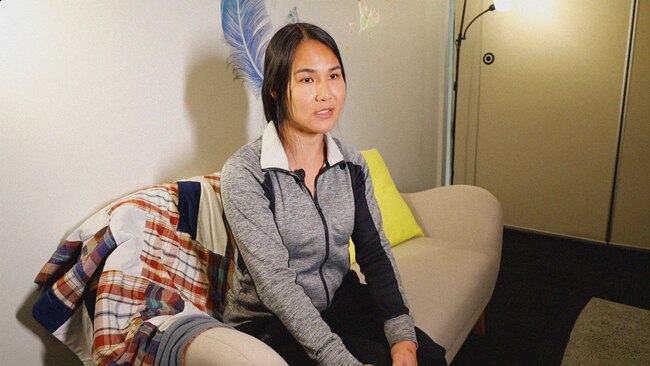8 in 10 DV victims can't save $500 to escape
This domestic violence service needs your help.

This domestic violence service needs your help.
Behind a nondescript door in inner Sydney lies a secret haven for more than 500 women and children fleeing family and domestic violence (FDV) each year.
The faded navy paint and CCTV camera perched above the intercom gives the shelter an appearance of an austere office, but for FDV victims like Pheeramas Bunyalak - known as ‘Bams’ to her friends - there’s nothing business-like about what’s inside. It’s a sanctuary.
“The place here is so beautiful. It‘s so convenient. It’s so comfortable. You have your own bedroom... I never thought there’s a place existing like this,” she says.
Bams is among the voices calling for donations to enable the Salvation Army improve its services that shelter women and children escaping violence.
It comes as a new survey from the Salvation Army found nine in ten family and domestic violence victims had experienced difficulty meeting necessary living expenses, such as housing, utilities, food, and health care in the previous 12 months.
Eight in ten of those surveyed said they could not save at least $500 for an emergency escape fund.
They have hopes of raising $1.2 million during its Red Shield Appeal donation drive this weekend when public contributions are matched by businesses such as Myer and Bunnings.
Petra Jenkins - The Salvation Army‘s Family and Domestic NSW and ACT State manager - told The Oz donations allowed the group “to do all the other stuff that is so important to their recovery, and helping them realise it is not their fault – and they are valued.”
She said funding was desperately needed to transform some of the Salvation Army’s old group boarding-style homes into studios and small units to allow FDV victims the privacy they need to heal, while also benefiting from support services on site.
Jenkins says women experiencing homelessness were more likely to put themselves in dangerous situations to ensure they have a roof over their head.
“Women are generally couch-surfing, they‘re staying with people that they wouldn’t normally stay with, they’re compromising themselves,” she said. "So when they might not want to be sleeping with someone, they will justify it in their head to sort of say, well, I’ll do that, because I can have a roof over my head, which is the worst decision to have to be making.”
Bams is glowing about the support she has received, which she says enabled her to reclaim her independence and dignity since escaping a violent partner two years ago.
“Once I experienced homelessness... it‘s very hard for me. Even food. When I stayed at my friend’s place I just felt a bit embarrassed and guilty that I couldn’t look after myself... it’s so hard that time.”
“During that time, I just hopped from one friend to another friend's house, you know, it just like, oh my God was what I’m going to do with my life? And then my former partner tried to convince me to try to push me to come back to him again, but I just said ’No, I can’t do that anymore.”
As a transgender woman, Bams says she never expected to be welcomed with such open arms by a Christian organisation, but she really feels at home at the shelter and is now one of the longest residents having stayed there for more than two years.
Jenkins said the number of women experiencing homelessness is growing but social housing stock wasn't keeping up.
“Sometimes as a society thinks that their homelessness is a direct result of decisions that they've made, but that’s really far from the truth a lot of the time."
Of the survey’s 1407 respondents, 49% said homelessness or the risk of homelessness had been the greatest challenge they had experienced in the past year.
Three in ten of those surveyed also said they could not afford a decent and secure home, 76% said being able to afford enough food was one of their biggest challenges and 66% went without meals because of a shortage of money.
Jenkins said family and domestic violence was “so widespread … anyone can be violent and abusive and anyone can be a victim of that”.
But she added there are other higher risk factors, such as being of Aboriginal or Torres Strait Islander descent, living with a disability, being economically marginalised, coming from a non-English-speaking background, having a family history of violence, or lacking a support network or a capacity to reach out to others for help.
And while many victims were unable to seek help during the pandemic, “now there has been an increase in demand in our Family Violence Program – we jumped from 33 calls a day to 100 calls, and it is still going up,” Jenkins said.
The Salvation Army Matched Giving Weekend is on June 17-19, when public donations are matched by businesses such as Bunnings and Myer. The Red Shield Appeal runs until June 30. Donate by calling 13SALVOS (13 72 58) or online at salvationarmy.org.au



